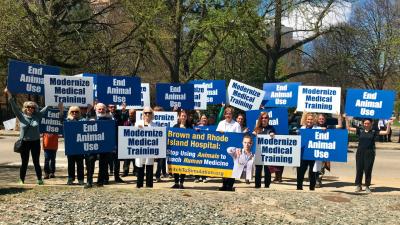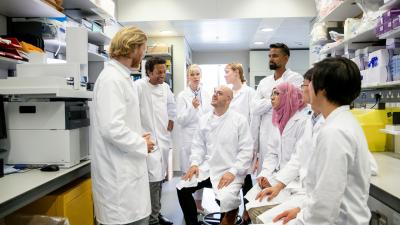Advocacy Groups Urge USDA to Lead Shift Toward Human-Relevant Nutrition Research

WASHINGTON, D.C. — A coalition of leading health, science, and animal protection organizations is calling on the U.S. Department of Agriculture (USDA) to modernize its nutrition research program by phasing out animal experiments and adopting human-relevant scientific approaches.
In a letter sent to Secretary of Agriculture Brooke Rollins, 20 organizations—including the Physicians Committee for Responsible Medicine, the Center for Biological Diversity, and the National Anti-Vivisection Society—recognized the USDA’s long-standing role in advancing nutrition science but urged the agency to align with other federal initiatives toward more predictive, human-specific research methods.
The coalition’s letter highlights that the USDA’s six Human Nutrition Research Centers (HNRCs) collectively spend tens of millions of dollars each year on animal-based studies, despite the availability of nonanimal methods and evidence that such research often fails to translate to human outcomes. The letter encourages the USDA to phase out animal experiments in favor of innovative tools such as organoids, tissue chips, computational modeling, and real-world human data.
Recent initiatives by other federal agencies have signaled a clear shift. In April 2025, the National Institutes of Health (NIH) announced the establishment of the Office of Research Innovation, Validation, and Application (ORIVA) to expand the development and use of nonanimal research methods, while the U.S. Food and Drug Administration (FDA) unveiled its Roadmap to Reducing Animal Testing in Preclinical Safety Studies. The organizations are calling on the USDA to join this growing interagency effort.
“Nutrition science should reflect human biology—not rely on animal experiments that fail to represent human diets or disease,” said Janine McCarthy, MPH, acting director of research policy of the Physicians Committee for Responsible Medicine. “It only makes sense for USDA’s Human Nutrition Research Centers to focus on human-based research. By committing to human-relevant methods, the USDA can lead a new era of nutrition science that directly benefits public health.”
The letter urges the USDA to develop and publicly share a roadmap to transition all USDA-funded nutrition research toward human-specific approaches, with greater collaboration across federal agencies, increased transparency, and targeted investment in training and human-based research technologies.
The letter contends that a USDA roadmap to phase out animal experiments in nutrition research would not only align with scientific and ethical progress but also advance national goals for chronic disease prevention and public trust in nutrition policy.
“We recognize the vital role USDA’s research programs play in advancing public health and food security, and we believe that transitioning away from animal experiments will improve both scientific outcomes and public confidence,” the letter states.
Signatories to the letter include:
Physicians Committee for Responsible Medicine, American Anti-Vivisection Society, Animal Interfaith Alliance, Antidote Europe, Black Veg Society, Center for Biological Diversity, Chilis on Wheels, Coalition for Healthy School Food, Common Threads, Healthy Kids Happy Planet, Humane World Action Fund, Humane World for Animals, International Foundation for Ethical Research, National Anti-Vivisection Society, Our Honor, Plant Powered Metro New York, Progressive Veterinary Association, Social Compassion in Legislation, True Health Initiative, and Voters for Animal Rights.
To speak with Janine McCarthy or see the letter, please contact Reina Pohl at 202-527-7326 or rpohl [at] pcrm.org (rpohl[at]pcrm[dot]org).
Media Contact
Reina Pohl, MPH
202-527-7326
rpohl[at]pcrm.org
Founded in 1985, the Physicians Committee for Responsible Medicine is a nonprofit organization that promotes preventive medicine, conducts clinical research, and encourages higher standards for ethics and effectiveness in education and research.







